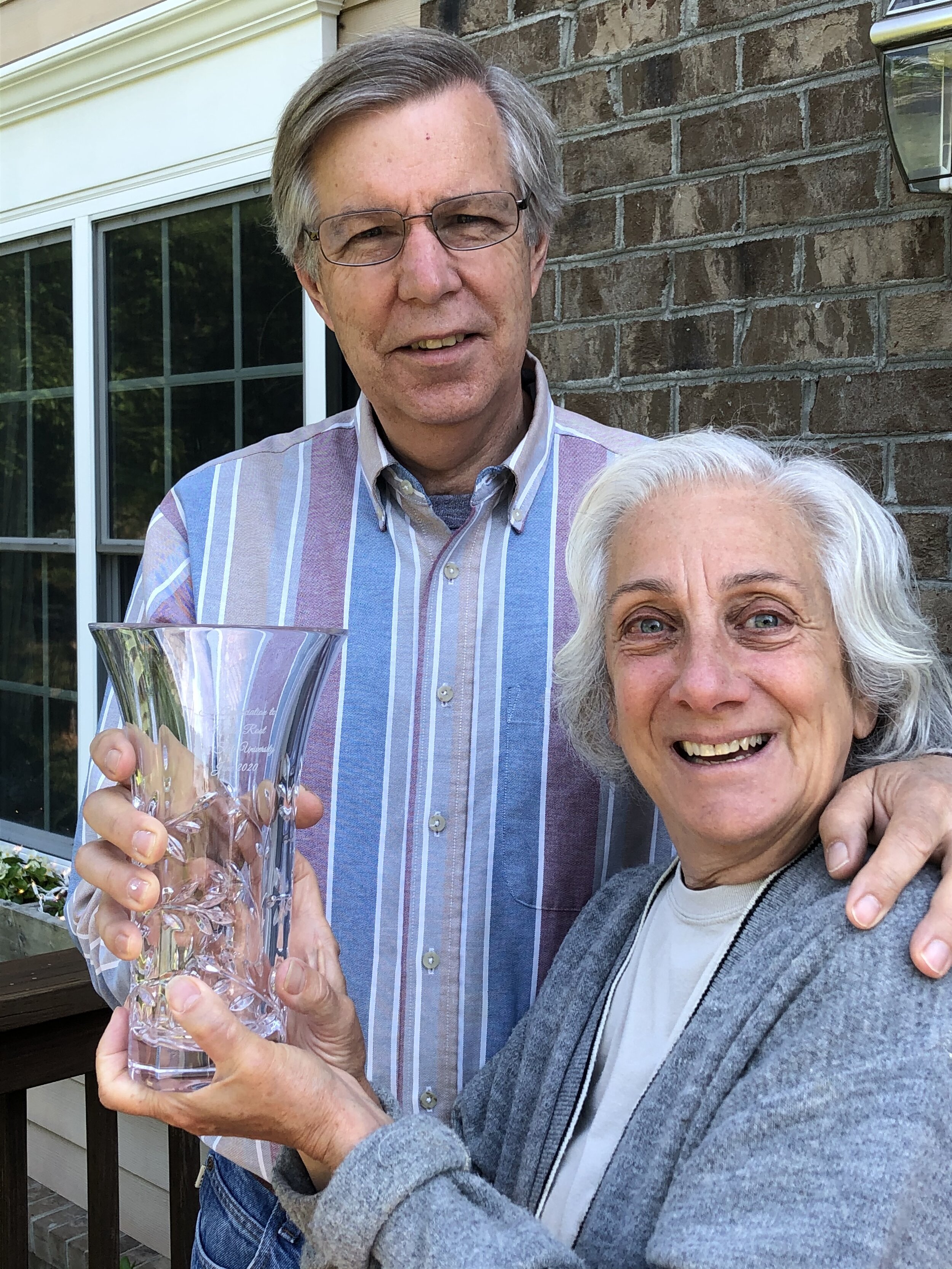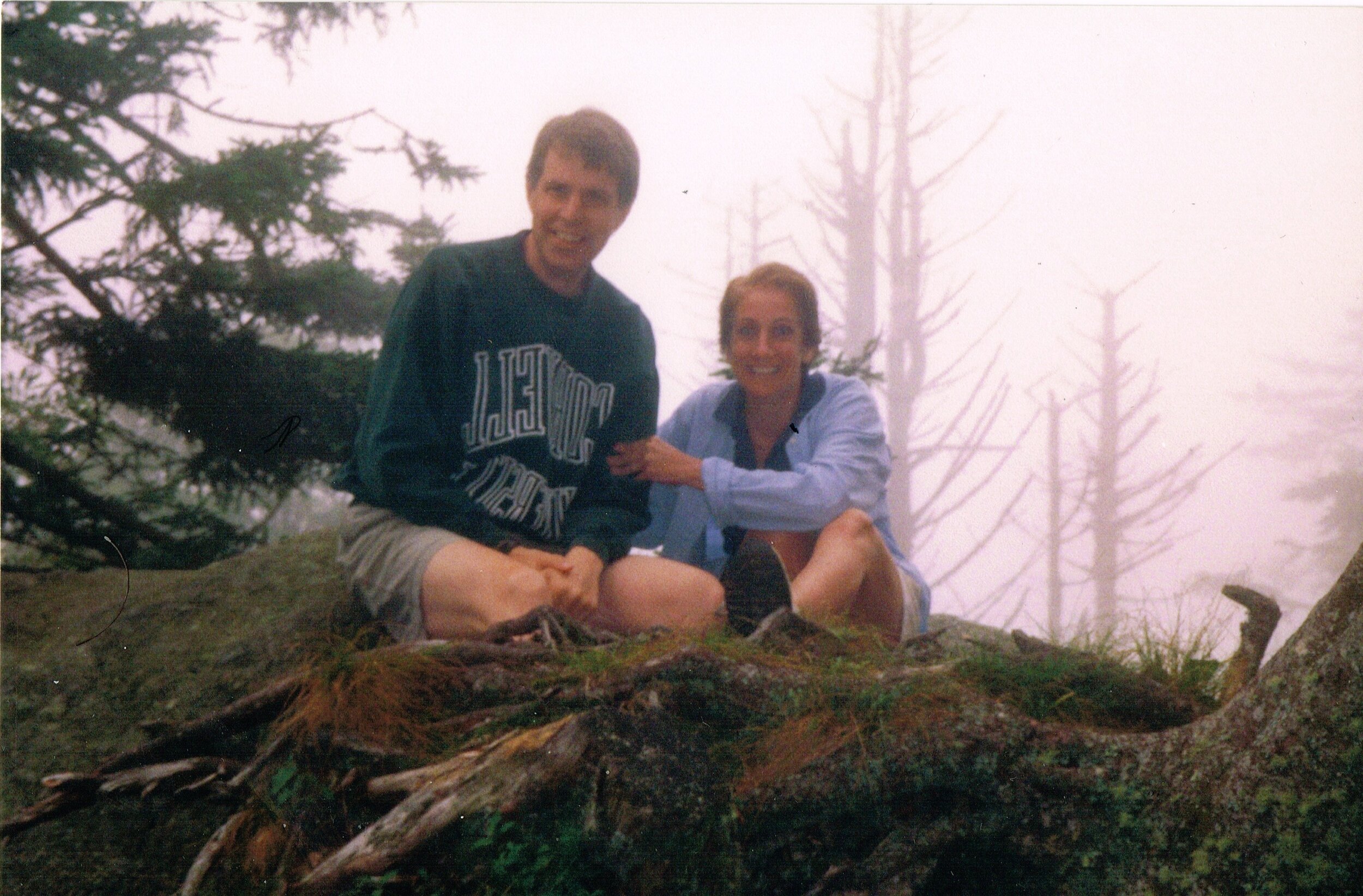Wonderfully Made
One ASU Professor’s Life-long Fascination with the Complexity of God’s Creation
By Zach Hoffman
Journeying together: Martin Root and his wife Connie celebrate Martin’s retirement. They hold a retirement gift presented to Martin by the chair of his department at ASU.
This post has been made possible by our wonderful partner Precision Cabinets.
Science Vs. Religion
When given the opportunity to speak about his faith, Appalachian State University (ASU) professor Dr. Martin Root asks his audience, when you look at the world around you and see how wonderfully it's made, does that cause your worship of God to be less or to be more?
“That's what science does for me,” says Martin. “It increases my worship of God. Other people, with a more skeptical view of science, might say well the more science you know the less you might want to worship God. But [for me] the more we know about science, the more we know about the world around us, the more we are amazed, the more we should be worshipping God.”
In questions of these supposedly “opposing” perspectives, science and religion, Martin recalls the homey example of a boiling tea kettle given by John Polkinghorne, a theoretical physicist turned Anglican priest.
In his adaptation of this teapot problem, Martin says, “The physicist comes in the kitchen and finds a tea kettle boiling and he makes a very physical explanation of how the vapor pressure of the water has reached a certain point because of the temperature and thus we have a boiling phenomenon. The chemist comes in and talks about water molecules and surface tension and a very chemical explanation of what's going on. The homeowner comes in and says, ‘Oh! Would you care for a cup of tea?’”
Science provides us with answers for how systems work (how the water boils), but why they work is outside of its purview. “Why” asks questions of meaning and purpose. But both perspectives are necessary to more fully understand the rich depth of God’s creation around us.
Martin says, “Science is a very good tool for explaining material things but it can't really explain why I love my wife. It really can't explain why Picasso was a great artist. It really can't explain why stars are beautiful. It really can't explain if God exists… It's just not the right tool.”
For Martin this world-view of faith and science working in harmony was forged by a few pivotal moments during his college years.
Meeting of the parents 1972: Martin’s father and Connie’s mother meet each other at a pre-wedding picnic in Upstate New York. From right to left, Connie, Martin, Martin’s father, and Connie’s mother.
A New Faith
He always had an interest in science and thanks to two wonderful teachers in school knew he was headed off to college with a career in biochemistry ahead of him.
“It was fascinating…” said Martin. “Hidden in each of us were these cells - and DNA held those secrets of life and controlled everything in the body. All those secret interactions that we don’t normally see from the outside were controlling all of us on the inside. The complexity, the beauty of it all was amazing and still is. I still get excited by it!”
Martin was a thoughtful young man, reading books such as “Walden Pond” and the “Bhagavad Gita” the summer after his senior year in high school. He had just been accepted at Cornell University. He was looking to see what the wider world had to offer and finding out it was a broad, amazing, and wonderful place to explore.
Even though he had grown up in the church, It was faith in God that took him by surprise at a church camp in the Adirondack Mountains of New York on August 28, 1969.
It was something he hadn’t really thought through.
Martin said, “I think if anything I saw Christianity and all that religious stuff as being very confining and not really having real answers.”
Instead, what he found at camp were people who were amazingly loving and very much engaged in the world and in the problems of the world.
So, when challenged to consider the Christian faith at that camp, he unquestioningly turned his life over to the Lord, excited to explore the new world that had been opened to him through faith in the powerful working of God.
“I think the thing that I was relieved to find at the time was that it didn’t compromise my intellectual life, it really challenged and broadened my intellectual life,” said Martin. “I didn't feel narrowed or confined by my new faith and was excited by that.”
Exploring their new home: Martin and Connie moved to Chapel Hill, NC in 1996 for Martin to begin work at a new startup company, BioSignia.
This post has been made possible by our wonderful partner Precision Cabinets.
Martin’s College Experience
It was only a few weeks later and Martin was off to college. He had the usual experiences that students do. The first few weeks were quite lonely. He remembers going entire days without opening his mouth even once to speak to another soul.
But of course, gradually he began making friends. As a very excited and growing Christians he got involved in several Christian groups on campus like Cru and others; he even regularly attended a Catholic charismatic group.
“I was so eagerly Christian…” said Martin. “I got involved in a whole bunch of groups to the point that my grades suffered.”
Martin said, “I actually failed… I think I actually failed biology - hmm, yeah! I’m a biochemistry major and I failed biology my first year... Rather embarrassing!”
Race forward 50 years, this experience has given him a lot of sympathy for his students at ASU who have rather poor GPAs. And he often shares with his classes how poorly he did in college as a case in point that they can graduate with a 2.4 GPA as he did and still have a reasonable career.
But despite these academic struggles, Martin found his defining intellectual challenges at Cornell in two similar experiences that instead of challenging his new faith solidified his understanding that religion and science could be friends not foes.
During a breakout section of a larger world history class, 8AM on a Monday with 20 fellow students, the Teacher’s Assistant (TA) was sick and Martin ended up sitting right next to this very popular world history professor.
The professor looked down and saw Martin’s Bible on top of his other books. The professor picked the Bible up, held it in front of the class and the first thing he said was, “I’ve read this book nine times and it’s the best reason to be an atheist.”
“Of course, I was horrified because I had been a Christian three months,” said Martin. “I realized what an antagonistic environment I was in. I hadn’t quite realized it so much. But that really obviously shaped my thinking.”
“I thought wait, wait, wait... it’s God! God made it all!”
God Made It All
Oddly enough, a couple years later Martin had a very similar experience in a breakout section for one of his larger classes - this time in biochemistry. Again the TA was sick and the professor, whom he greatly admired, had mesmerized the class with her knowledge and understanding of the sciences.
It got to be the end of class and she said, “Well, that’s all students… It’s all fascinating material isn't it? Isn’t evolution fascinating?”
Martin said, “And I thought wait, wait, wait... It’s God! God made it all.”
Science seeks to understand the “how” - the mechanisms that exist within a system, through observation and hypotheses. But the “how” does not change the “who”. The fact that God did it does not change.
“And I realized again the conflict I had between my Christian faith and this non-Christian view.” Martin said, “Interestingly, I didn’t take it as a conflict and I still don’t.”
In these experiences Martin’s worldview was formed. He did not see this professor as his enemy, she the atheist and he the Christian. Instead he answered for himself this same question of choice that he can now help his own students navigate.
In the Lab: Professor Martin Root conducts research on apple phytochemicals, the potentially healthy chemicals in apples, with the assistance of ASU undergraduate, Leslie McCullen. Martin taught nutrition in the College of Health Sciences at ASU for 12 years before retiring just this year.
Hard Questions
“Christian college students who go into the sciences think oh my goodness is this my choice between being a faithful Christian and an atheistic scientist? And my point would be no that's a false choice you don't have to choose between those two,” said Martin.
Yes there are hard questions but Christians have always faced hard questions.
Free will is a hard choice, a hard thing that Christians have dealt with for a long time. The problem of evil in the world, that's a very difficult philosophical question but that's been on the Christian’s plate for a long time. And now evolution and creation is a touchy issue for Christians because it seems to conflict with Genesis.
“But -” Martin said, “We've dealt with hard questions before so let's just deal with it. Let's just put it on our plate and work on it. It's not a reason to give up on Christianity.”
We all have agendas, and so even as Christians it's important to be able to step back from our own biases and prejudices. Step back far enough to be able to see and hear what other people are saying, to be able to clearly and articulately interact with them. Otherwise we are just creating more bias.
In fact, there's a very famous quote, going all the way back to St. Augustine from the 4th Century, which says;
“Usually, even a non-Christian knows something about the earth, the heavens, and the other elements of the world… and this knowledge he holds to as being certain from reason and experience. Now, it is a disgraceful and dangerous thing for a [non-Christian] to hear a Christian, presumably giving the meaning of Holy Scripture, talking nonsense on these topics; and we should take all means to prevent such an embarrassing situation, in which people show up vast ignorance in a Christian and laugh it to scorn... to the great loss of those for whose salvation we toil... If they find a Christian mistaken in a field which they themselves know well… how are they going to believe… in matters concerning the resurrection of the dead, the hope of eternal life, and the kingdom of heaven, when they think [them] full of falsehoods on facts which they themselves have learnt from experience and the light of reason?”
Many accomplished scientists of this century and the past have been strong Christians. Their faith in God and in God’s order of the universe gave them confidence to study the world around them. Their study of the world around them increased, not decreased, their sense of wonder and worship of the creator.
Psalm 8:3-4 says, “When I look at the night sky and see the work of your fingers - the moon and the stars you set in place - what are mere mortals that you should think about them, human beings that you should care for them?”
Now, at the age of 68, Martin Root has retired from his 12 year tenure of teaching nutrition in the College of Health Sciences at ASU.
“Every single time I stand in front of a class,” says Martin. “I think my God what a privilege this is. I have 20 to 30 students looking at me and I think what do I have to offer them, can I meet their expectations? Wow! I can't believe that God lets me do these things. It's been such fun, such a privilege, such an honor to be able to do this.”
This article was originally written for the Winter 2020 Edition of The Journey Magazine
This post has been made possible by our wonderful partner Precision Cabinets.







